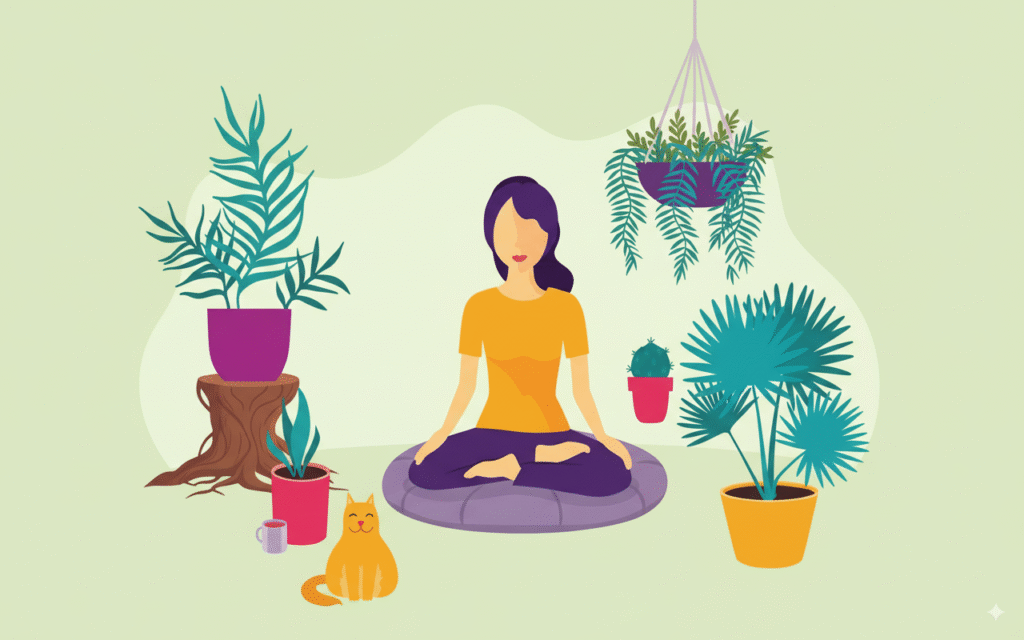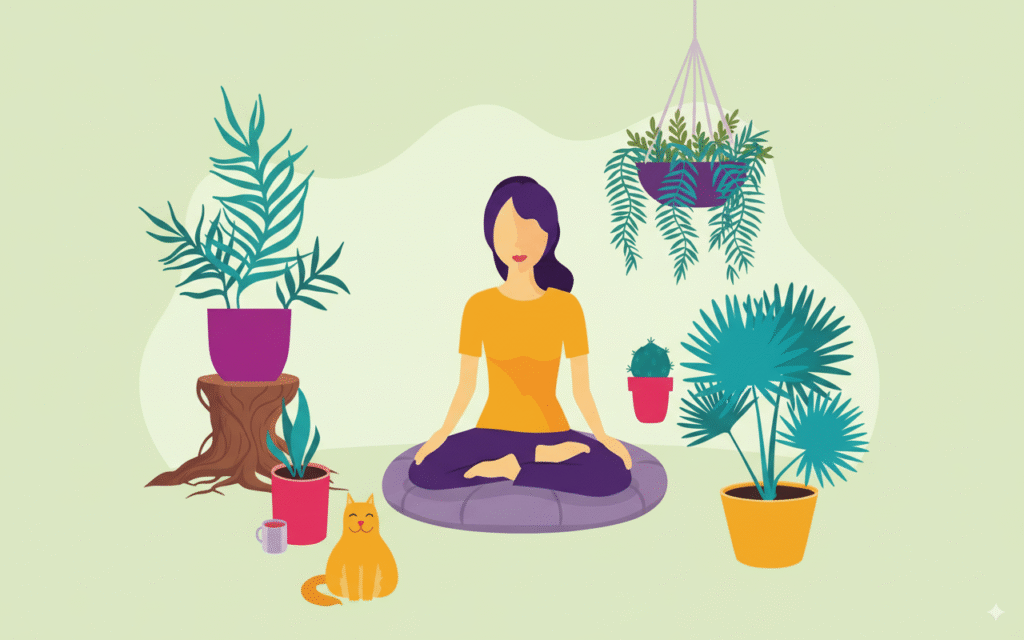
Feeling stressed? Feeling too much? The Surprising Strength of Simply Sitting Still in Meditation
Do you ever feel like your mind is like a web browser with too many tabs open? You want to focus on one thing, but your phone keeps buzzing with notifications, your old worries keep playing in the background, and your to-do list is a pop-up ad that won’t go away.
This is how we feel in our fast-paced, hyper-connected world. We are always being pulled in a million different directions, and our brains rarely get a chance to just stop.
What if I told you that there is a simple, old practice that works like a “close all tabs” button for your mind? It doesn’t need any expensive gear, a body that can bend, or a lot of your time. It only takes you, a quiet place, and a few minutes to breathe.
Meditation is what I’m talking about. It could be the superpower you’ve been looking for.
What Meditation Isn’t
Let’s get a few things straight before we talk about the benefits. It’s not about “clearing your mind” when you meditate. That’s an impossible job! Your brain is made to think.
Meditation is the act of watching your thoughts without judging them. Imagine you’re sitting on the bank of a river. The leaves and twigs that float by are your thoughts. You don’t have to jump in the river and chase them; you can just watch them float by. The river can be fast and full of stuff, or it can be slow and clear. The point is to sit and watch.
The Life-Changing Benefits of Doing Something Every Day
What happens if you watch that river every day? The good things spread to every part of your life
1. Control Your Inner Stress Monster
This is the most important thing for most people. Meditation is a great way to lower stress. Our bodies release cortisol, the “fight or flight” hormone, when we are stressed. Studies have shown that meditating regularly can lower cortisol levels, which can help your body and mind go from being on high alert to resting and recovering. You will be able to stay calm more easily and respond less strongly to stressful situations.
2. Stay focused in a world full of things that can distract you
We are always being attacked on our attention spans. Our brains have learned to move from one thing to the next because of emails, social media, and constant notifications. Meditation is like working out your attention muscle. When you keep bringing your attention back to your breath, you are teaching your brain to stay on task. You will do better at work, in conversations, and in any other activity that needs your full attention if you can focus better.
3. Take charge of your feelings as the CEO
Meditation helps you put a small but important space between a feeling and how you react to it. It helps you become more aware of yourself so you can recognize feelings like anger, sadness, or anxiety as they come up without letting them take over your life. This doesn’t mean you won’t feel things; it just means you’ll be able to choose how you react more. You stop reacting and start acting on purpose.
4. Better sleep means better health
The number one thing that keeps you from getting a good night’s sleep is a racing mind. Meditation can be a great natural sleep aid because it calms your nervous system and helps you let go of the worries of the day. Studies have shown that meditation can help with more than just sleep. It can lower blood pressure, boost the immune system, and even help with pain management. Your body follows your mind when it’s at ease.
5. Grow kindness and compassion
Getting to know your own mind can make you more compassionate toward yourself and others. When you stop judging your own wandering thoughts, you start to treat yourself and the people around you with the same kindness.
How to Begin (It’s Not As Hard As You Think!)
Are you convinced? Here’s an easy guide for your first session.
Find a Quiet Place: A place where you won’t be bothered for a few minutes.
Put a timer on: Begin small! For real. Just give it a shot for three to five minutes. You can always add more time later.
Get Cozy: You can sit in a chair with your feet on the floor or on a cushion with your legs crossed. The goal is to be alert, comfortable, and standing up straight.
Pay attention to your breathing: Close your eyes and pay attention to how your breath feels. As you breathe in, pay attention to the air coming into your nose and filling your lungs. As you breathe out, pay attention to how your chest gently falls. Don’t try to change it; just watch it.
Be nice when your mind starts to wander (and it will!): You might start thinking about your grocery list, a conversation you had yesterday, or what to make for dinner in just a few seconds. This isn’t a failure! This is the whole point. When you realize your mind has wandered, gently and without judging, bring your attention back to your breath.
That’s all. The whole point of the practice is to notice when your mind has wandered and gently bring it back. Every time you do that, you’re working out your brain.
Conclusion:
Meditation isn’t a magic pill that will make all of your problems go away right away. It’s a habit. It’s a steady, gentle way to train your mind. Some days will be simple, and other days your mind will feel like a zoo. But by being there for just a few minutes every day, you are giving yourself a deep gift: the gift of being present, calm, and more connected to yourself.
